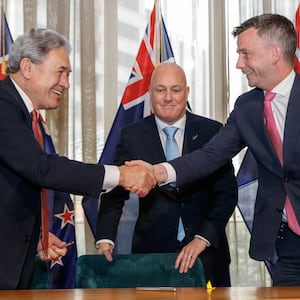World
Coalition Leaders Address UN Rapporteur’s Criticism, Clarify Response

The coalition government in New Zealand has faced scrutiny following its handling of criticisms from a United Nations special rapporteur regarding the country’s approach to indigenous rights. Leaders of the coalition, including Winston Peters, the Foreign Affairs Minister, and David Seymour, the Regulations Minister, have publicly dismissed claims of government disarray.
On Tuesday, the situation became clearer as both leaders outlined their plans for a formal response to the criticisms raised by Albert K. Barume, the UN special rapporteur on indigenous rights. The controversy began when it was revealed that David Seymour had unilaterally drafted a letter addressing Barume’s concerns without consulting his coalition partners. This decision led to questions about the unity and coherence of the government’s stance on indigenous issues.
Withdrawal and New Direction
Following a meeting with Winston Peters, David Seymour announced his decision to withdraw the initial letter. Reports indicate that the meeting was convened to discuss the implications of Seymour’s letter and the need for a unified response. During this discussion, it was agreed that Peters would take the lead in drafting a new letter to formally respond to Barume’s criticisms on behalf of the government.
The shift in strategy reflects an effort to present a cohesive front in response to the UN’s inquiries. Nonetheless, there remains uncertainty regarding the specifics of the new letter and how it will address the issues raised by the UN rapporteur.
Seymour’s initial letter had been intended to clarify New Zealand’s position on indigenous rights, but the decision to withdraw it highlights the potential for discord within the coalition. Peters emphasized the importance of collaboration among coalition partners to ensure that New Zealand’s response is both comprehensive and representative of the government’s broader goals.
Focus on Indigenous Rights
The criticisms from Albert K. Barume center on New Zealand’s indigenous rights agenda and the necessity for the government to engage more effectively with Māori issues. The UN rapporteur’s comments are significant, as they align with international expectations for countries to uphold and promote the rights of indigenous populations.
The upcoming letter from Peters is expected to outline the government’s commitment to addressing these criticisms while reaffirming its dedication to indigenous rights. Observers are keen to see how the government reconciles its internal dynamics with the pressing need to respond to international scrutiny.
As the situation develops, it remains crucial for the coalition to maintain a united front. The ability to address the concerns raised by the UN will not only impact New Zealand’s international reputation but also its domestic policies regarding the treatment of its indigenous population.
The response to Barume‘s report is likely to be a critical moment for the coalition government as it navigates both internal and external expectations. The outcome will be closely monitored by various stakeholders, including Māori leaders and human rights advocates, who are concerned about the government’s approach to indigenous rights moving forward.
-

 World1 week ago
World1 week agoPrivate Funeral Held for Dean Field and His Three Children
-

 Top Stories2 weeks ago
Top Stories2 weeks agoFuneral Planned for Field Siblings After Tragic House Fire
-

 Sports3 months ago
Sports3 months agoNetball New Zealand Stands Down Dame Noeline Taurua for Series
-

 Entertainment3 months ago
Entertainment3 months agoTributes Pour In for Lachlan Rofe, Reality Star, Dead at 47
-

 Entertainment2 months ago
Entertainment2 months agoNew ‘Maverick’ Chaser Joins Beat the Chasers Season Finale
-

 Sports3 months ago
Sports3 months agoSilver Ferns Legend Laura Langman Criticizes Team’s Attitude
-

 Sports1 month ago
Sports1 month agoEli Katoa Rushed to Hospital After Sideline Incident During Match
-

 World2 weeks ago
World2 weeks agoInvestigation Underway in Tragic Sanson House Fire Involving Family
-

 Politics2 months ago
Politics2 months agoNetball NZ Calls for Respect Amid Dame Taurua’s Standoff
-

 Top Stories2 weeks ago
Top Stories2 weeks agoShock and Grief Follow Tragic Family Deaths in New Zealand
-

 Entertainment3 months ago
Entertainment3 months agoKhloe Kardashian Embraces Innovative Stem Cell Therapy in Mexico
-

 World4 months ago
World4 months agoPolice Arrest Multiple Individuals During Funeral for Zain Taikato-Fox















